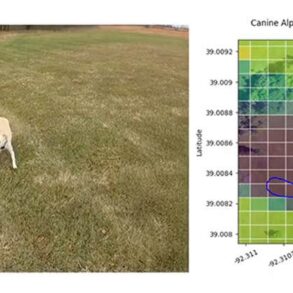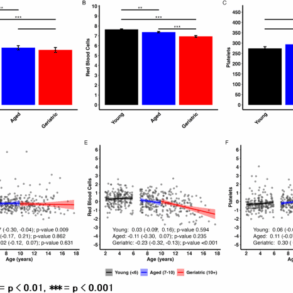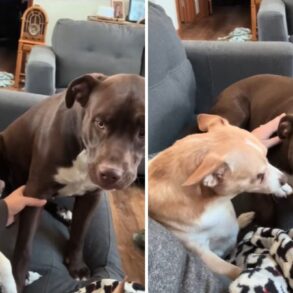A little more than a year ago, a West Nashville woman was walking her rat terrier, Scrappy, in her neighborhood when she encountered a German shepherd.
“We didn’t make it very far until out of nowhere, the dog (I would later learn her name is Rosie) came up and started attacking Scrappy,” the woman wrote in a complaint to Metro Animal Care and Control (MACC).
Rosie had jumped the front-yard fence of a nearby home. Scrappy’s owner picked him up but the German shepherd leapt up toward them. A neighbor who saw the incident described it in a report to MACC.
“The German shepherd jumped in the air, grabbed the dog and ripped the skin off its back,” the neighbor wrote, adding “the dogs at this residence are often in the front and are aggressive towards everyone walking by.”
The son of Rosie’s owner ran outside to get the German shepherd, but by then Scrappy, the five-pound rat terrier, had a bloody bare patch on his thigh where the skin and fur had been torn off. Scrappy recovered after a trip to the emergency veterinarian and six weeks of care.
His owner called MACC and filed a vicious dog report. An animal control officer issued a vicious dog citation to the German shepherd’s owners. With that, the case entered a largely obscure corner of the Nashville court system at the intersection of public safety, animal rights, neighborly relations and people’s emotional attachments to their pets. The multi-level court process can cost time and money for people — the case resulting from Scrappy’s run-in with Rosie took around a year to resolve. For dogs, the consequences can range from a muzzle to euthanasia.
When Dogs Bite
Dog attacks of various kinds happen with some regularity in Nashville. In 2024, MACC recorded 807 dog bites and 84 vicious dog complaints, according to records obtained by the Banner. They range from reports of loose dogs killing backyard chickens, pet guinea pigs, house cats and other dogs to stories like the West Nashville case involving neighborhood encounters that end with a person or their dog getting bitten.
MACC director Ashley Harrington outlined the basic process that follows. When the department receives a complaint, an animal control officer reviews the account and any accompanying evidence — photos, videos, vet records, etc. — to determine whether the accused dog could be deemed vicious, a designation that is actually defined in the Metro Code. A vicious dog, according to Chapter 8 of the code, is one “which attacks and bites, or which seriously injures or kills, a person or animal on any public or private property without provocation.” The code also defines the potentially mitigating “provocation” as “any act that causes an animal to bite or attack to protect itself, offspring, owner or property.”
If the officer decides that test has been met, they will issue a citation to the dog’s owner, sending the case to Environmental Court, where a court-appointed referee oversees enforcement of Metro Codes violations. Created by a state law in 1993 and modified in 2001, the court was the subject of a lawsuit questioning its constitutionality in 2019. It has also been criticized as a place where Nashvillians who can’t afford an attorney are penalized for lacking the time or financial resources to, say, keep their yard as tidy as a neighbor’s or attend to an inoperable vehicle. A 2022 Nashville Scene cover story explored in detail the ways that the complaint-driven codes enforcement process has been weaponized against Black and low-income residents.
When it comes to dog cases, determining whether an attack occurred is theoretically straightforward — they tend to leave a mark. But deciding whether a dog is “vicious” and what should be done with it can be more complicated.
How Vicious Dog Cases Move Through Court
Renard Hirsch has been the Environmental Court Referee since 2017. It’s his job to rule on cases of alleged Metro Code violations — a few recent examples included a church where the fire alarm had been going off wrongly and a man cited for having several vehicles in various states of disrepair parked in front of his house. His caseload also often includes disputes over dogs.
Those cases can be difficult, he said, because attacks are not often witnessed by a neutral party and even the owner of a victimized dog may be reluctant to testify against a neighbor they’ll be regularly bumping into. On top of that, the owners of the accused dog are typically appearing in court without an attorney. Lawyers from Metro Legal work with complainants and animal control officers and are sometimes called to testify, but the complainant themselves is often leading the process as a private prosecutor. For those unfamiliar with a courtroom, it can feel like getting dropped into an episode of “Judge Judy.”
In 2024, Hirsch heard 106 vicious dog cases, according to court records. Most ended there, with a fine for the owner and restrictions for the dog, if anything at all. The Metro Code allows him to order that a dog deemed to be vicious be kept in a specified enclosure or implanted with a microchip for future identification. But it also allows him to order that the dog be euthanized — in the words of the code, to “be destroyed in a humane manner.”
When he’s considering how to rule on these cases, he asks, “How persistent was the attack? How vicious was the attack? How much damage was done?”
He also noted that the breeds are often a factor.
“Some dogs are just big strong dogs and they may only attack one time in their life, but when they do attack … they do a lot of damage very quickly,” he said.
Hirsch issued 29 euthanasia orders last year for dogs like a pit bull (Diesel) who attacked and killed a Yorkshire terrier (Nash) after being left unleashed and Rosie the German shepherd in West Nashville, although Rosie was one of a number of dogs who would later be spared from that sentence.
Metro Legal attorneys would not discuss the subject on the record, although one did share his personal experience with dogs that bite. Allen Smith, a self-described dog person who works on some vicious dog cases for Metro, said his family growing up had a strict rule about euthanizing dogs that showed any sign of unprovoked aggression. As a teenager, that meant his beloved Airedale terrier had to be put down.
“Brutus was my guy,” Smith recalled. “He was out walking with my mother, who was all of 4-foot-11, and he just snapped and killed a toy poodle.”
Hirsch said he grew up with dogs, too, and has nothing against them. He said he understands the love people on both sides of the cases he hears have for their dogs.
“I didn’t make the rules, that’s a Metro Council issue,” he said. “I just try to apply the rules as fairly as I can and just go from there. I don’t have a preference for the person or the dog or anything like that.”
While some — including more than one attorney who spoke to the Banner — may feel that Hirsch’s trigger finger is too quick, he repeatedly pointed to criticism he receives from victims who feel he went too easy on a dangerous dog who attacked them or their pet. In any case, Hirsch often doesn’t have the final word. Both sides have the right to appeal his decision to a General Sessions judge — and even again to a Circuit Court judge — and when he orders euthanasia, many dog owners do.
Appealing Euthanasia
Nashville criminal defense attorney Ryan Terrell had no experience with vicious dog cases when a friend of a friend called him about a German shepherd named Rosie facing euthanasia. After Hirsch’s order, the dog’s owners asked for the case to be reheard by presiding General Sessions Judge Allegra Walker and they were looking for an attorney to help them.
He took the case and he thought Rosie’s owners had a reasonable one. The German shepherd, he told the Banner, had just given birth to puppies which were in the front yard. The attack was not without provocation, he argued, but a reaction to a small barking dog getting too close to her litter.
Walker heard the case in General Sessions court in June, and upheld the euthanasia order. Then, Rosie’s owners appealed again, this time to the Circuit Court. A hearing date there was set for March 15, 2025, nearly a year after the incident. Animal control still recommended euthanasia due to the “egregious nature” of the attack, according to case records.
But then, days before the hearing in March, the sides agreed to resolve the case without euthanasia. An order from the Circuit Court Judge Amanda McClendon said Rosie, the German shepherd, was found to be “vicious” and must be spayed, microchipped and muzzled whenever she was off the owner’s property. The order also required the dog’s owners to keep their fencing in good condition and imposed a $50 fine.
Terrell said it’s important to acknowledge that there was a person on the other side of the case who had a truly scary experience and whose dog suffered a “pretty egregious injury.” Still, he believed the settlement — which he’d also proposed when the case was in General Sessions court — was reasonable. He said he was surprised how easy it was to reach and how amenable Metro Legal attorneys were after the euthanasia order had been pursued for nearly a year.
Their experience is not unique. In 19 of the 29 cases where Hirsch initially issued a euthanasia order last year, dog owners appealed their case to General Sessions or Circuit Court. In 10 of those cases, the euthanasia order was overturned. Three others are still awaiting court dates. Another case was dismissed for failure to prosecute, suggesting the complaining party didn’t return to court to continue pursuing the case.
Terrell said his experience — echoed in the records of recent cases — taught him that dog owners can probably beat a euthanasia order, albeit after months of waiting and thousands of dollars on legal fees.
“If you feel like you’re in a situation where your dog does not need to be euthanized, you should probably fight it,” Terrell said.
Cases Pending
Meanwhile, the cases of allegedly vicious dogs and the people who own them keep coming to the courts. Appeals are currently pending in the matter of a dog named Big Boy, who received a euthanasia order in January, and another named Bear, ordered to be put down in February.
More recently, the case of a Bellevue area man and his two Alaskan huskies made headlines and raised questions about whether truly dangerous dogs are being left in the hands of irresponsible owners. David Bishop was arrested in March after his huskies — Thunder and Lightning — got away from him during a walk and attacked a female English setter that later had to be put down. Bishop was charged with dogs running at large causing death. But it turned out not to be the first violent incident involving his dogs. Court records show both dogs in recent years were the subject of euthanasia orders that were later overturned on appeal. Just two months before the attack on the English setter, Hirsch ordered one of the dogs, Lightning, to be euthanized in January after an attack on another animal in December. The cases against Thunder, Lightning and Bishop are still pending.
This post was originally published on this site be sure to check out more of their content.










































